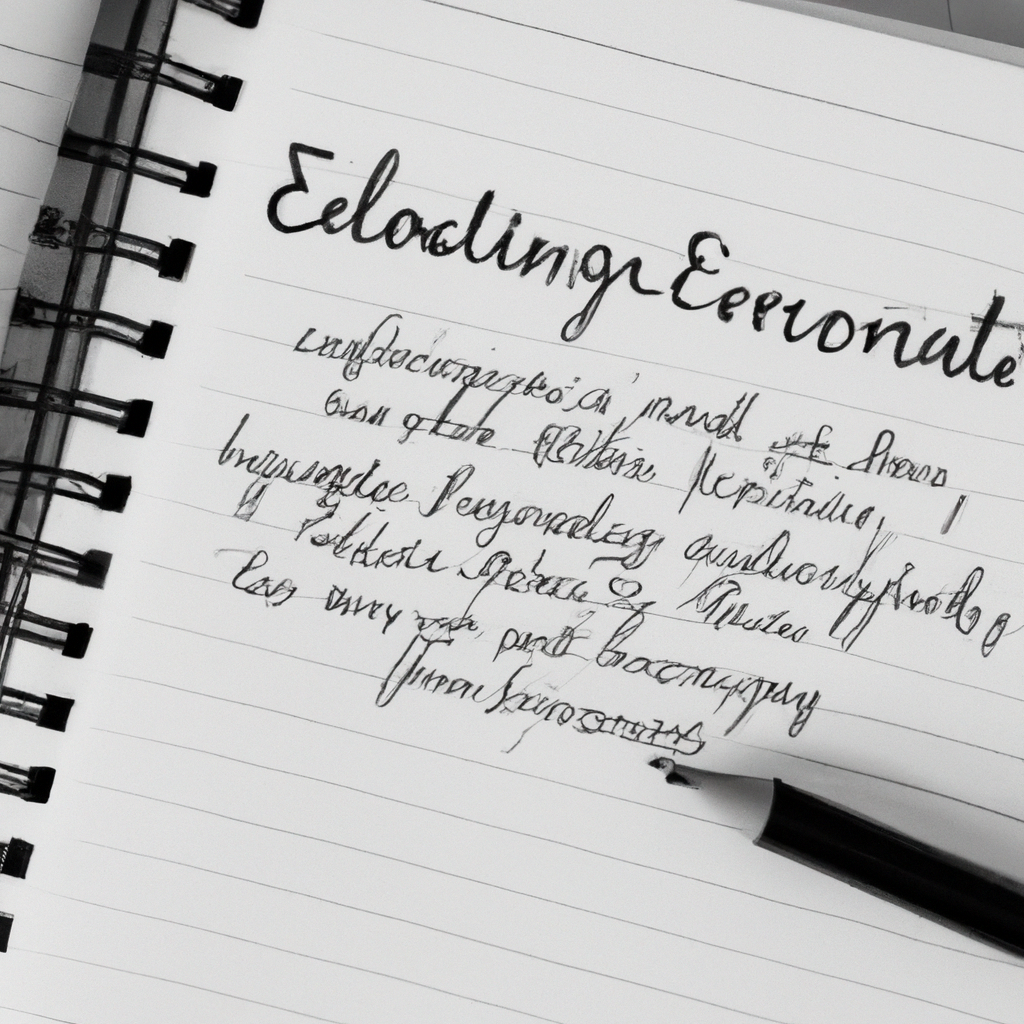Many of us live a busy, chaotic lifestyle that can be both exhilarating and overwhelming. In order to handle the constant barrage of decisions and emotions life throws our way, journaling can be a powerful tool that allows us to process our thoughts and emotions. Journaling provides a safe, secure way of releasing and understanding our feelings, empowering us to become healthier individuals – both mentally and emotionally.
1. Unlocking Your Emotional World Through Journaling
Journaling can be an incredibly fulfilling and discovering tool that helps to unlock a world of insight and understanding into your emotional responses, values, and beliefs. With regular practice, you can use journaling to help you become more aware of your emotional world, allowing you to take more control over your feelings and responses.
Here are some methods of using journaling to explore your emotional world:
- Self-reflection: Developing a practice of regularly journaling about yourself can help uncover hidden feelings about yourself and your situations. Make sure to explore both the light and dark emotions by asking thought-provoking questions.
- Creativity: Exercising your creativity on paper is a great way to explore different feelings and perspectives. Engage with doodles, poetry, or creative writing to map out your thoughts and feelings in a new way.
- Self-care: Bring an attitude of acceptance to your journaling practice. Allow the pages to be your space of non-judgemental comfort and understanding, allowing you to connect with your true self.
2. Exploring Feelings and Letting Go with Writing
Writing is a powerful tool for understanding and letting go of our feelings. There are many ways to explore our emotions through writing, such as:
- Freewriting
- Journals
- Poetry
- Letters
Freewriting is a great way to get started. Here, we start writing without thinking and just allow our thoughts to flow out – no judgement, editing, or worrying about grammar or syntax. This can help us uncover our hidden thoughts and feelings. Writing down our thoughts and emotions can also help us to make sense of them, to acknowledge and accept them, and to let go of them. We can also use journals to explore our emotions: creating regular entries to work through a particularly difficult period of life, or even to simply capture the beautiful moments. Additionally, writing poems or letters can also help us to reflect on our feelings and to move through them with grace and kindness.
3. Tapping into Self-Awareness with Thoughtful Reflections
Having a solid knowledge of who you are is incredibly valuable for charting a path through life. To stay truly connected to yourself, however, requires that you take time to reflect upon your thoughts and emotions. Thoughtful reflection can help to unlock self-awareness that might otherwise be unavailable.
Begin with a few moments of meditation. Breathing exercises will help to put the mind at ease and create an inner stillness ideal for self-reflection. Then, ask yourself the tough questions
- What joys am I trying to discover?
- What are the issues and needs that I’m struggling with?
- How can I strive to honour those needs and wants in my life?
As you continue to examine yourself more closely, you may find that in the quiet moments of contemplation, you have expressed feelings that had previously been left unexpressed. In this way, thoughtful self-reflection can help to uncover and rediscover important truths about yourself.
4. Releasing Stress and Pressure with Creative Allowance
At times, the pressure of juggling work, life and personal growth can feel too heavy for anyone. It’s only natural to want to break free and cut loose. The reality can be hard to swallow when that isn’t an option.
While everyday life may seem restrictive, there are creative ways to still find an allowance to disconnect and let go of stress. Here are several ways to help you:
- Take a break from electronics. The constant stimulation that our digital lives bring can often increase stress levels. Take a break from your phone, laptop, and even television to help bring down the noise.
- Do something creative. Letting your artistic side go wild is one of the best ways to release stress. When your unconscious takes over, your troubles can take a back seat.
- Partake in physical activities. Sometimes going for a jog, a long bike ride or a HIIT session can be just what you need to help ease the mind and forget about other stressors.
- Find a healthy outlet with friends. Being able to share your troubles and laughs with the right people is always a welcome relief. Sharing activities like watching a movie, playing a game of cards or chess — or anything in between — can be the perfect form of recreation.
5. Finding New Perspectives and Freedom Through Journaling
Journaling is a powerful tool that allows for great perspective and can lead to newfound freedom. Many of us find ourselves trapped in a cycle of negativity, and journaling can be a way to break out.
- Think about the way you’re feeling and what’s causing that
- Write out the feeling and any emotions that arise
- Take a step back and see what could be causing the emotion
- Acknowledge any irrational fears or beliefs that may be impacting your mindset
Examining your current situation can be the first step in achieving the growth or freedom that you seek. Journaling can allow you to escape the voice in your head that is causing you pain and truly explore and embrace a new perspective. Not only can this help you in having a clearer thought process on decisions that you make, but it can enable you to step away from a situation and gain insight into it without being too closely connected to it. Journaling can help you not only to find freedom but also to understand the situation in a new light.
Journaling is an often overlooked tactic for managing emotions and processing thoughts. Whether by sketching or writing, the act of externalizing the internal gives us the distance and clarity to effectively move through difficult times. Dedicating time and effort to unlock thoughts and feelings will lead to more self-awareness and emotional intelligence. So ignite the power of journaling, and watch life begin to open up.




